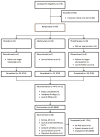Effect of 2 Psoriasis Treatments on Vascular Inflammation and Novel Inflammatory Cardiovascular Biomarkers: A Randomized Placebo-Controlled Trial
- PMID: 29776990
- PMCID: PMC5991103
- DOI: 10.1161/CIRCIMAGING.117.007394
Effect of 2 Psoriasis Treatments on Vascular Inflammation and Novel Inflammatory Cardiovascular Biomarkers: A Randomized Placebo-Controlled Trial
Abstract
Background: Psoriasis is a chronic inflammatory disease associated with dyslipidemia, cardiovascular events, and mortality. We aimed to assess and compare the effect of treatment of moderate-to-severe psoriasis with adalimumab or phototherapy on vascular inflammation and cardiovascular biomarkers.
Methods and results: Randomized, double-blind, trial of adalimumab, phototherapy, and placebo (1:1:1) for 12 weeks, with crossover to adalimumab for 52 weeks total. Outcomes included vascular inflammation by 18F-fluorodeoxyglucose positron emission tomography/computed tomography and biomarkers of inflammation, insulin resistance, and lipoproteins. Ninety-seven patients were randomized, 92 completed the randomized controlled trial portion; 81 entered the adalimumab extension with 61 completing 52 weeks of adalimumab. There was no difference in change in vascular inflammation at week 12 in the adalimumab group (change compared with placebo, 0.64%; 95% confidence interval, -5.84% to 7.12%) or the phototherapy group (-1.60%; 95% confidence interval, -6.78% to 3.59%) or after 52-week adalimumab treatment (0.02% compared with initiation; 95% confidence interval, -2.85% to 2.90%). Both adalimumab and phototherapy decreased inflammation by serum CRP, interleukin-6. Only adalimumab reduced tumor necrosis factor and glycoprotein acetylation at 12 and 52 weeks. Neither had an impact on metabolic markers (insulin, adiponectin, and leptin). Only phototherapy increased high-density lipoprotein-p at 12 weeks. At 52-week of adalimumab cholesterol efflux and high-density lipoprotein-p were reduced.
Conclusions: Adalimumab reduced key markers of inflammation including glycoprotein acetylation compared with phototherapy with no effect on glucose metabolism and vascular inflammation, and potential adverse effects on high-density lipoprotein. Glycoprotein acetylation improvement may partially explain the beneficial effects of adalimumab seen in observational studies. Larger studies with more detailed phenotyping of vascular disease should assess the comparative differences in the effects of adalimumab and phototherapy seen in our study.
Clinical trial registration: URL: https://www.clinicaltrials.gov. Unique identifiers: NCT01866592 and NCT01553058.
Keywords: adalimumab; biomarkers; inflammation; psoriasis.
© 2018 American Heart Association, Inc.
Figures




Comment in
-
Psoriasis and Inflammation More Than Skin Deep.Circ Cardiovasc Imaging. 2018 Jun;11(6):e007849. doi: 10.1161/CIRCIMAGING.118.007849. Circ Cardiovasc Imaging. 2018. PMID: 29807889 No abstract available.
References
-
- Goff KL, Karimkhani C, Boyers LN, Weinstock MA, Lott JP, Hay RJ, Coffeng LE, Norton SA, Naldi L, Dunnick C, Armstrong AW, Dellavalle RP. The global burden of psoriatic skin disease. The British journal of dermatology. 2015;172:1665–1668. - PubMed
-
- Gelfand JM, Neimann AL, Shin DB, Wang X, Margolis DJ, Troxel AB. Risk of myocardial infarction in patients with psoriasis. Jama. 2006;296:1735–1741. - PubMed
-
- Mehta NN, Li R, Krishnamoorthy P, Yu Y, Farver W, Rodrigues A, Raper A, Wilcox M, Baer A, DerOhannesian S, Wolfe M, Reilly MP, Rader DJ, VanVoorhees A, Gelfand JM. Abnormal lipoprotein particles and cholesterol efflux capacity in patients with psoriasis. Atherosclerosis. 2012;224:218–221. - PMC - PubMed
Publication types
MeSH terms
Substances
Associated data
Grants and funding
LinkOut - more resources
Full Text Sources
Other Literature Sources
Medical
Research Materials
Miscellaneous

